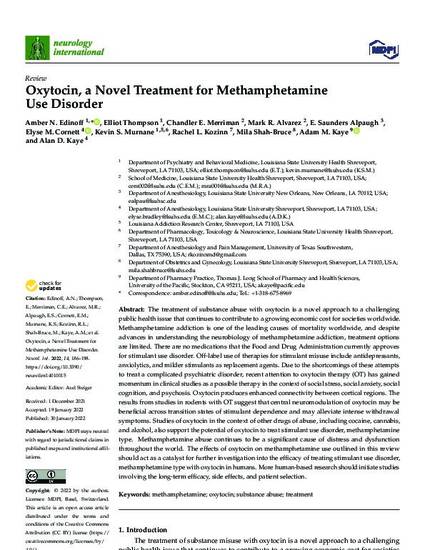
The treatment of substance abuse with oxytocin is a novel approach to a challenging public health issue that continues to contribute to a growing economic cost for societies worldwide. Methamphetamine addiction is one of the leading causes of mortality worldwide, and despite advances in understanding the neurobiology of methamphetamine addiction, treatment options are limited. There are no medications that the Food and Drug Administration currently approves for stimulant use disorder. Off-label use of therapies for stimulant misuse include antidepressants, anxiolytics, and milder stimulants as replacement agents. Due to the shortcomings of these attempts to treat a complicated psychiatric disorder, recent attention to oxytocin therapy (OT) has gained momentum in clinical studies as a possible therapy in the context of social stress, social anxiety, social cognition, and psychosis. Oxytocin produces enhanced connectivity between cortical regions. The results from studies in rodents with OT suggest that central neuromodulation of oxytocin may be beneficial across transition states of stimulant dependence and may alleviate intense withdrawal symptoms. Studies of oxytocin in the context of other drugs of abuse, including cocaine, cannabis, and alcohol, also support the potential of oxytocin to treat stimulant use disorder, methamphetamine type. Methamphetamine abuse continues to be a significant cause of distress and dysfunction throughout the world. The effects of oxytocin on methamphetamine use outlined in this review should act as a catalyst for further investigation into the efficacy of treating stimulant use disorder, methamphetamine type with oxytocin in humans. More human-based research should initiate studies involving the long-term efficacy, side effects, and patient selection.
Available at: http://works.bepress.com/adam-kaye/181/
